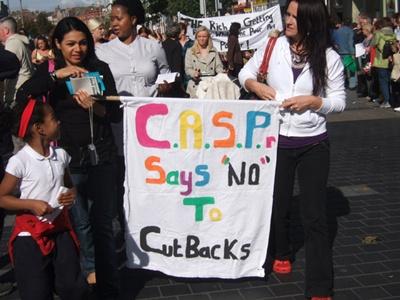No excuse for cuts in respite care or disability services

People with disabilities and their carers indict the government's lack of support for their needs during recent protests. By Sara Burke.
As people with disabilities and their families marched outside the Dail on July 7, those listening to the speeches inside heard reassurances from the Taoiseach and Ministers Harney and Maloney that no respite services for people with disabilities have been cut. If we are to believe our political leaders, why did thousands of people take to the streets on July 7 in Dublin, Galway and Castlebar?
Because services have been cut. These include:
- Bawn Og respite service in Limerick was shut three weeks ago
- Two bungalows of self contained flats for people with disabilities in Swinford, Co Mayo have closed recently
- Day services in St Louis Centre in Chapelizod - brand new services opened just a year ago - closed in June because they needed to redeploy staff to keep residential and respite services open
- As of Monday 12 July the Daughters of Charity respite services on the Navan Road has been reduced from 7 days to 4 days a week
- Ard Cuan in Cabra, which provides respite for 80+ families, will close on 26 July.
- The Brothers of Charity in Galway are planning to close two community houses at the end of the year, and will have to implement a 40% cut in respite care in 2011 if they are going to live within current budget.
Some services have been cut and others are planned for cuts in Limerick, Dublin, Galway, Mayo and Sligo.
This is happening because budgets are being cut. For example, the budget of the Daughters of Charity in Dublin was cut last year by €3m and this year they have received a €4m cut, on top of staff reductions and Value for Money efficiencies. The Daughters of Charity only heard about their cut in budget in February, and the cut of 56 staff in May. Because they have no service level agreement there has been no discussion with HSE management as to how best to continue to provide the services they do without impacting on the people and families who use these services.
In disability care, as in much of social care, the majority of costs are spent on staff. People are essential to good care. The Daughters of Charity in Dublin feel they have no choice but to reduce services so as to live within their budget with fewer staff.
Do protests like those of July 7 make any difference? The disability protest certainly brought the cuts in disability services to national attention. The government said it was not necessary to take to the streets, yet very clearly people on the streets felt that they needed to be there, because their family’s services are being cut.
Although budgets have hugely increased in the past ten years, that is mitigated by the fact that they were starting from an almost non-existent base. Even the raising of budgets has not led to state-of-the-art services. Families with disabilities have to fight for every service they get, and many people are waiting for services for residential care, supported housing or respite care.
Many of the people I talked to at the protest were getting just two nights a month respite care. This means that parents of adult children with disabilities take care of their children 24/7 apart from this meagre two nights of respite care. Both they and their children need this care.
Additionally, voluntary providers are providing care because the state do not. In the past religious orders filled this vacuum and more recently families, friends and local groups have set up many semi-independent homes, residential care and support services for people with disabilities. These services have developed in a totally ad hoc, unplanned manner, and have never been reformed. There is no regulation or inspection of care homes for people with intellectual disabilities, which means no-one knows how well these people are being cared for.
People with intellectual disabilities are the only section of the population in residential care that remain uninspected. There are about 8,000 people with an intellectual disability in residential care, 400 children in homes, all uninspected.
People with disabilities who attended the July 7 protest were very clear that they want services provided in a different way. Currently people have to go to the service provider in their area and take what services are on offer. But what people with disabilities and their families would prefer is to have money spent on disability in a much more transparent way – so that they know how much money is allocated to their care and they have a choice on how and where they spend that care. Lets wait and see who is right – the protesters or the politicians.
